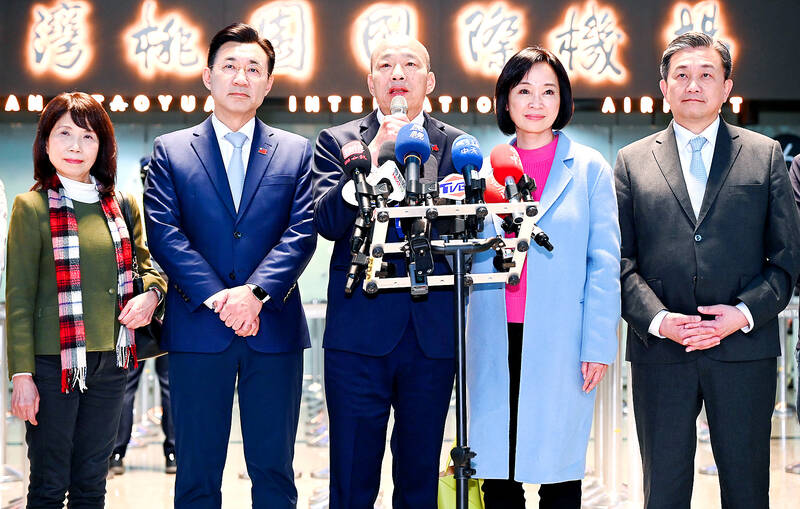A delegation of cross-party lawmakers from Taiwan, led by Legislative Speaker Han Kuo-yu (韓國瑜), for the inauguration of US president-elect Donald Trump, would not be able to attend the ceremony, as it is being moved indoors due to forecasts of intense cold weather in Washington tomorrow.
The inauguration ceremony for Trump and US vice president-elect JD Vance is to be held inside the Capitol Rotunda, which has a capacity of about 2,000 people.
A person familiar with the issue yesterday said although the outdoor inauguration ceremony has been relocated, Taiwan’s legislative delegation has decided to head off to Washington as scheduled.

Photo: Chu Pei-hsiung, Taipei Times
The delegation would also conduct parliamentary diplomacy by visiting overseas Taiwanese and members of the US Congress, and they hope their visit can deepen the Taiwan-US relationship, reaching a new milestone, they said.
The US Joint Congressional Committee on Inaugural Ceremonies (JCCIC) plans to move tomorrow’s inauguration ceremony indoors, just as former US president Ronald Reagan’s second inauguration in 1985 was also forced to relocate to the Capitol Rotunda due to cold weather, the person said.
Live viewing of the inaugural ceremony would be moved to Capital One Arena.
With the ceremony shifted indoors, most of the ticketed guests, and many domestic and foreign dignitaries would no longer be able to attend it in person, they added.
The Taipei Economic and Cultural Representative Office in the US is doing its best to handle the situation, as it on Friday morning had just reported to media about its arrangements for the delegation and suddenly learned about the JCCIC’s decision to cancel the outdoor ceremony, they said.
The decision to move the ceremony indoors is to prevent tens of thousands of dignitaries, law enforcement officers, paramedics and members of the public from getting cold injuries, they said, adding that it is rare for Washington to have extreme cold weather, but hopefully everyone can stay warm and safe.
Meanwhile, Han yesterday at Taiwan Taoyuan International Airport said many foreign leaders were also on their way even with the threat of heavy snow, and that he was going there to extend Taiwan’s “highest blessings” to the US.
“All of our delegation members likewise are taking this enthusiasm to the US to represent [our] 23 million people, and we extend our highest blessings to the US presidential team and to the people of the US,” he said.
Taiwan enjoyed strong support from the first Trump administration, including regularizing arms sales which have continued under US President Joe Biden. However, Trump unnerved Taiwan on the campaign trail by calling for it to have to pay to be defended.
The US, like most countries, has no formal diplomatic ties with Taiwan, but is bound by law to provide the nation with the means to defend itself.
During a meeting in Taipei on Friday with Mike Pence, former vice president in Trump’s first administration, President William Lai (賴清德) said that given China’s threats against Taiwan and Beijing’s cozying up to countries such as Russia, democracies needed to work together.
“I believe that when the partnership between Taiwan and the US becomes stronger, the power to maintain peace and stability in the world will also become stronger,” Lai told Pence.
Additional reporting by Reuters

Taiwan is to commence mass production of the Tien Kung (天弓, “Sky Bow”) III, IV and V missiles by the second quarter of this year if the legislature approves the government’s NT$1.25 trillion (US$39.78 billion) special defense budget, an official said yesterday. Commenting on condition of anonymity, a defense official with knowledge of the matter said that the advanced systems are expected to provide crucial capabilities against ballistic and cruise missiles for the proposed “T-Dome,” an advanced, multi-layered air defense network. The Tien Kung III is an air defense missile with a maximum interception altitude of 35km. The Tien Kung IV and V

The disruption of 941 flights in and out of Taiwan due to China’s large-scale military exercises was no accident, but rather the result of a “quasi-blockade” used to simulate creating the air and sea routes needed for an amphibious landing, a military expert said. The disruptions occurred on Tuesday and lasted about 10 hours as China conducted live-fire drills in the Taiwan Strait. The Civil Aviation Administration (CAA) said the exercises affected 857 international flights and 84 domestic flights, affecting more than 100,000 travelers. Su Tzu-yun (蘇紫雲), a research fellow at the government-sponsored Institute for National Defense and Security Research, said the air

Taiwan lacks effective and cost-efficient armaments to intercept rockets, making the planned “T-Dome” interception system necessary, two experts said on Tuesday. The concerns were raised after China’s military fired two waves of rockets during live-fire drills around Taiwan on Tuesday, part of two-day exercises code-named “Justice Mission 2025.” The first wave involved 17 rockets launched at 9am from Pingtan in China’s Fujian Province, according to Lieutenant General Hsieh Jih-sheng (謝日升) of the Office of the Deputy Chief of the General Staff for Intelligence at the Ministry of National Defense. Those rockets landed 70 nautical miles (129.6km) northeast of Keelung without flying over Taiwan,

A strong continental cold air mass is to bring pollutants to Taiwan from tomorrow, the Ministry of Environment said today, as it issued an “orange” air quality alert for most of the country. All of Taiwan except for Hualien and Taitung counties is to be under an “orange” air quality alert tomorrow, indicating air quality that is unhealthy for sensitive groups. In China, areas from Shandong to Shanghai have been enveloped in haze since Saturday, the ministry said in a news release. Yesterday, hourly concentrations of PM2.5 in these areas ranged from 65 to 160 micrograms per cubic meter (mg/m³), and pollutants were